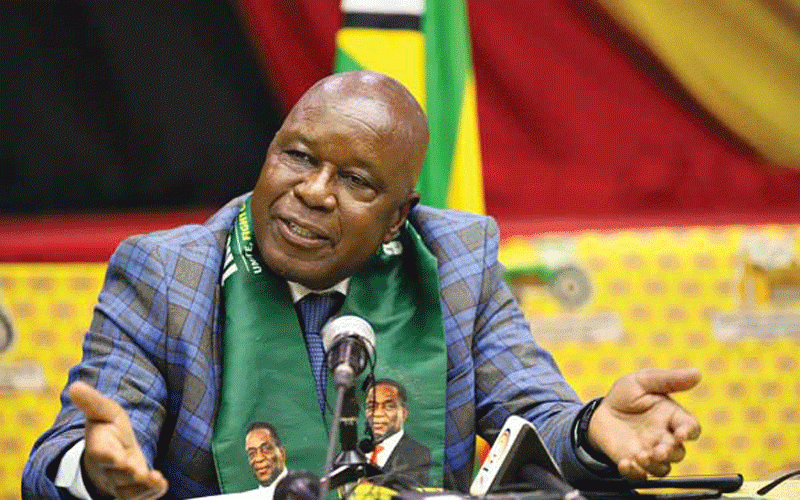
Finance minister Patrick Chinamasa will find the task of raising sufficient money to stimulate growth in the economy a formidable challenge.
Painona with with Tapiwa Nyandoro
Country risk is considered high and the State fragile. The latter is why a grand coalition, as German chancellor Angela Merkel is/was considering for Germany, would have been the best option for President Robert Mugabe’s Cabinet.
Alas, his party’s win in the 2013 elections was too big leaving him probably with a mammoth headache.
“When the gods want to punish you,” it is said, “they answer your prayers.”
Victory in hand, it is time for Zanu PF to deliver on its time-constrained manifesto.
And delivery, unfortunately, calls for substantial off-shore resources.
Regrettably, the continued pariah status and debt overhang means there is still a severe crisis of confidence in the debt markets with regards to Zimbabwe.
- Chamisa under fire over US$120K donation
- Mavhunga puts DeMbare into Chibuku quarterfinals
- Pension funds bet on Cabora Bassa oilfields
- Councils defy govt fire tender directive
Keep Reading
What Rwanda and Zambia have done recently, in raising money by issuing government bonds, which were overwhelmingly oversubscribed, is still to Zimbabwe a pipe dream.
It will be difficult for the country to obtain long-term concessionary private financing using traditional financing instruments, such as industry, parastatal or government bonds. The macho position taken before the elections as regarding the Highly Indebted Poor Country (HIPC) status may have to be reversed. Other urgent house-cleaning issues to assist the country to join the community of nations and in the process enhance the flow of capital into the country, have to be addressed as well.
These include the perception of the absence of the rule of law, its perceived selective application and legacy issues as regards the land reform programme.
High level corruption too, has to be reined in.
Wherever possible, especially in the mining and agriculture sectors, ministerial and presidential discretion should be replaced with rules and regulations.
Such discretion provides the temptation and opportunity for massive corruption by the political elite.
After cleaning the national balance sheet of the debt overhang, perhaps by acquiring the HIPC status and boldly shining the light on the activities in Chiadzwa’s diamond fields by listing the Zimbabwe Mining Development Corporation, besides complying with the International Monetray Fund’s staff monitored programme requirements, developmental funding organisations may feel Zimbabwe’s hands have been sanitised enough to sit down a round table to discuss funding options to resuscitate the dying economy.
At this point, after the house-cleaning exercise, innovative funding solutions such as future — (cash) flow securitisation, can be seriously entertained.
Before then, the Finance ministry and the nation risk wasting time on talk.
Desperate times call for desperate actions.
And Finance minister Chinamasa is a desperate man.
He has joined the down and out in counting and hoping to sell his chickens before they are hatched.
He wishes to borrow money on the strength of untapped mineral resources.
He described this initiative as a “new concept where you are using something that is untapped, an asset that is still underground”. In other words, borrowing using anticipated profits from the sale of minerals, yet to be mined, as collateral.
This securitisation of untapped natural resources is not exactly a new concept.
According to Finance & Development (F&D) issue of June 2009: “Securitisation is a much maligned term . . . because the (current) global crisis had its roots in securitised debts in the United States . . . (though) securitisation was not the problem, but over aggressive valuation of the underlying assets”.
This, the journal suggested, can be corrected by providing ample excess coverage to allow for declines in the value of the underlying collateral.
It is so simple though easier said than done.
There are specific risks involved, apart from inadequate infrastructure in the country and neighbouring states.
The peculiar risks are basically the same as found in Zimbabwe’s own small scale future — flow securitisation contracts, that is contract farming.
According to F&D, these risks to untapped asset securitisation are:
Performance risk — associated with the issuing entity’s ability to generate receivables/revenue to pay back the loan. Our contract farmers find drought an evergreen excuse for not generating revenue, and failure to service their loans.
Product risk — associated with the stability (predictability) of cash flows because of price and volume fluctuations, such as witnessed recently with low cotton prices and,
Diversion risk — if the issuer’s government forces sales to customers other than the contracted one. This is quite common with our diamond miners and cotton contract farmers. A shrewd risk assessor might conclude that such diversion is a national trait.
In addition to the matter of risk, Zimbabwe will need to do extensive exploration and prospecting for full information on the stock of its mineral reserves.
This calls for substantial investment, the so-called “sunk costs” which may, or may not be recovered, depending on the findings. Given the total absence of fiscal space, foreign direct investment (FDI) may be the only option.
The minister concedes that the country has no expertise on such securitisation and has delegated the responsibility of educating the nation on the way forward to the African Development Bank. So will Zimbabwe get the money, given its reputation and securitisation’s threat on sovereignty?
And won’t the current generation leave the burden of repayment, yet again to future generations?
Isn’t FDI better as the risk remains the investor’s?
Why is Zimbabwe trying to do it otherwise when countries like Japan and Germany, which rose from ashes, and of late China and Asian tigers have gotten away without having to mortgage their souls?











